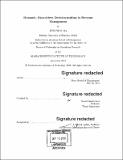| dc.contributor.advisor | David Simchi-Levi. | en_US |
| dc.contributor.author | Ma, Wei (Will Wei) | en_US |
| dc.contributor.other | Massachusetts Institute of Technology. Operations Research Center. | en_US |
| dc.date.accessioned | 2019-02-05T15:59:08Z | |
| dc.date.available | 2019-02-05T15:59:08Z | |
| dc.date.copyright | 2018 | en_US |
| dc.date.issued | 2018 | en_US |
| dc.identifier.uri | http://hdl.handle.net/1721.1/120224 | |
| dc.description | Thesis: Ph. D., Massachusetts Institute of Technology, Sloan School of Management, Operations Research Center, 2018. | en_US |
| dc.description | Cataloged from PDF version of thesis. | en_US |
| dc.description | Includes bibliographical references (pages 233-241). | en_US |
| dc.description.abstract | Motivated by applications in Revenue Management (RM), this thesis studies various problems in sequential decision-making and demand learning. In the first module, we consider a personalized RM setting, where items with limited inventories are recommended to heterogeneous customers sequentially visiting an e-commerce platform. We take the perspective of worst-case competitive ratio analysis, and aim to develop algorithms whose performance guarantees do not depend on the customer arrival process. We provide the first solution to this problem when there are both multiple items and multiple prices at which they could be sold, framing it as a general online resource allocation problem and developing a system of forecast-independent bid prices (Chapter 2). Second, we study a related assortment planning problem faced by Walmart Online Grocery, where before checkout, customers are recommended "add-on" items that are complementary to their current shopping cart (Chapter 3). Third, we derive inventory-dependent priceskimming policies for the single-leg RM problem, which extends existing competitive ratio results to non-independent demand (Chapter 4). In this module, we test our algorithms using a publicly-available data set from a major hotel chain. In the second module, we study bundling, which is the practice of selling different items together, and show how to learn and price using bundles. First, we introduce bundling as a new, alternate method for learning the price elasticities of items, which does not require any changing of prices; we validate our method on data from a large online retailer (Chapter 5). Second, we show how to sell bundles of goods profitably even when the goods have high production costs, and derive both distribution-dependent and distribution-free guarantees on the profitability (Chapter 6). In the final module, we study the Markovian multi-armed bandit problem under an undiscounted finite time horizon (Chapter 7). We improve existing approximation algorithms using LP rounding and random sampling techniques, which result in a (1/2 - eps)- approximation for the correlated stochastic knapsack problem that is tight relative to the LP. In this work, we introduce a framework for designing self-sampling algorithms, which is also used in our chronologically-later-to-appear work on add-on recommendation and single-leg RM. | en_US |
| dc.description.statementofresponsibility | by Will (Wei) Ma. | en_US |
| dc.format.extent | 364 pages | en_US |
| dc.language.iso | eng | en_US |
| dc.publisher | Massachusetts Institute of Technology | en_US |
| dc.rights | MIT theses are protected by copyright. They may be viewed, downloaded, or printed from this source but further reproduction or distribution in any format is prohibited without written permission. | en_US |
| dc.rights.uri | http://dspace.mit.edu/handle/1721.1/7582 | en_US |
| dc.subject | Operations Research Center. | en_US |
| dc.title | Dynamic, data-driven decision-making in revenue management | en_US |
| dc.type | Thesis | en_US |
| dc.description.degree | Ph. D. | en_US |
| dc.contributor.department | Massachusetts Institute of Technology. Operations Research Center | |
| dc.contributor.department | Sloan School of Management | |
| dc.identifier.oclc | 1082871059 | en_US |
